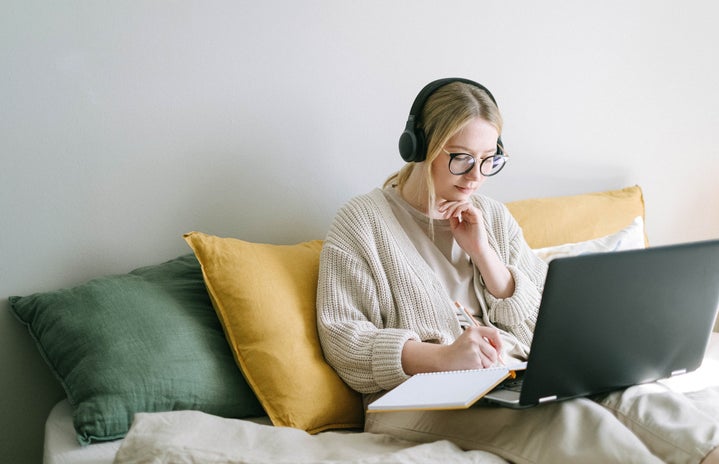Over a year ago, most of our lives were turned upside down. Faced with the unprecedented circumstances of COVID, everyday living became overshadowed by grief, fear, and constant worry. So, it wasn’t particularly surprising when an influx of articles and posts about productivity during a pandemic began filling our timelines. Don’t worry about your productivity, mental health is the top priority, some told me. However, there were others that said: Now’s your time to accomplish all the things you’ve wanted to do!
The more I saw of so-called “quarantine productivity” plastered across social media, the more convinced I became that adjusting to the extraordinary circumstances as quickly as possible was the best way to go. Yet, as the need to maintain grades, relationships, and hobbies grew stronger, the less in control I felt. I was able to achieve a semblance of perceived normalcy for several months but began to struggle more and more with accomplishment and happiness as the year turned over. Days and weeks seemed to blur together, and I began to forget a time before the era of COVID. At times, I couldn’t even find the motivation to get out of bed, fearing the sheer amount of work awaiting me. I kept telling myself that I would eventually get over my burnout. Maybe next week. Or the week after that.
But as the US got (and continues to get) closer to becoming sufficiently vaccinated, I felt like I was running out of time. I stopped seeing articles about prioritizing mental health over productivity. Left and right, there were only people talking about “returning to a normal life”. Like many mental health struggles, it seemed like we were expected to get over our slumps and immediately embrace the freedom of a post-COVID life. But what if I couldn’t? What if I was still stuck?
Below are some of the practices and reminders that have been personally useful to remember when it comes to productivity in a time of unpredictability.
Try to Maintain a Consistent Sleep Schedule
This one’s been tough for me too, so don’t worry if your sleep schedule hasn’t gotten any better over the past year! As the ultimate revenge bedtime procrastinator, I’ve had many mental arguments with myself trying to justify staying up until 3AM and later. Personally, I’ve found setting goals and phone reminders to be good motivation for sleeping earlier. Also, don’t try to make large changes all at once; just gradually move your bedtime earlier and don’t worry if you occasionally fall off the wagon. Sleeping earlier and more consistently is a huge accomplishment, so celebrate and be proud of yourself for achieving every goal you set!
Don’t Be Afraid to Ask for Extensions
This one speaks for itself. I have always felt an immense amount of pressure to turn in every assignment on time or earlier, and to resist asking for any extra time to complete work (I’m a late-day hoarder, if you couldn’t tell already). However, if you’re struggling with stress or a lack of productivity, don’t be afraid to email your TAs and professors about requesting an extension on homework or projects. Given more time, you can produce higher-quality and more meaningful work – something that always helps me regain confidence in my own abilities.
Block Out Time to Spend with Family and Friends
Simply put, spending time with family and friends can really help lighten the pressure of school and work. Whether it’s talking to your family and coworkers about how the pandemic has affected you or just discussing the latest movie and TV news with your best friend, socializing is a great way to appreciate everyone who has supported you and those who believe in your success. Spending quality time with others can take many forms, from texting to video chatting. Special shoutout to my sister for somehow putting up with me for hours on end almost every day, I have absolutely no idea how you do it.
Adopt Some (Safe) Leisure Activities
If you’re still feeling stressed about your lack of productivity, it often helps to take a break and go outside. Personally, I’ve taken on the hobby of walking around my neighborhood while listening to an audiobook or some music. Rather than singularly focusing on a task for several hours and getting nothing accomplished, it’s vastly more beneficial to take the time to refocus the mind before returning to work. I’ve always found myself less stressed and more excited to get back to work after taking a break.
Finally, never forget that you are allowed to struggle with adopting any/all the practices outlined above! I’ve failed to keep up with them at one point or another for the last few months myself. But taking the time to understand our strengths and weaknesses concerning productivity is, and should be, just as important now as it was a year ago.


